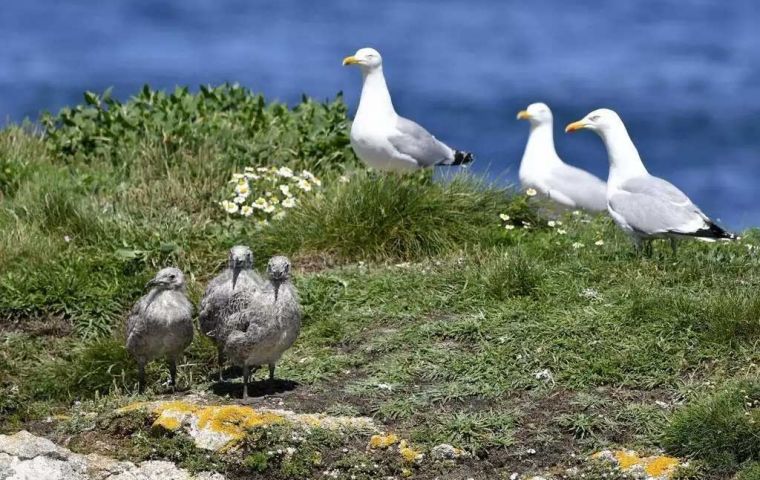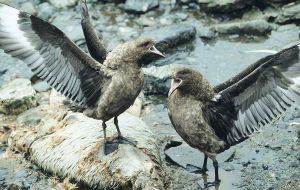MercoPress. South Atlantic News Agency
Avian Influenza confirmed in Bird Island; South Georgia introduces stringent bio-security measures
 Bird Island is one of the most closely monitored seabird and seal colonies in the world, so ongoing studies will reveal the impacts of the disease in detail.
Bird Island is one of the most closely monitored seabird and seal colonies in the world, so ongoing studies will reveal the impacts of the disease in detail. Highly Pathogenic Avian Influenza (HPAI) has been confirmed in brown skua populations on Bird Island, South Georgia. In response to the situation on Monday, the Government of South Georgia & the South Sandwich Islands (GSGSSI) has introduced a comprehensive Management Plan and new regulations to further protect terrestrial habitats and the remarkable animals and plants found in those islands.
Following reports of several potentially symptomatic birds and unexplained mortality, British Antarctic Survey (BAS) staff took samples which were returned to the UK and tested by the Animal and Plant Health Agency laboratories in Weybridge. These swabs have now been processed and the positive swab results represent the first confirmed cases of HPAI in the Antarctic region.
The primary means of spread of HPAI is through natural pathways and the confirmed presence of the disease on the South American continent made it highly probably that the disease would arrive in South Georgia in the 23/24 season, likely from birds returning from their migration.
In readiness the Government of South Georgia & the South Sandwich Islands (GSGSSI) updated its guidance on HPAI risk and response in the Territory. This included enhanced biosecurity procedures and mitigation measures to be put in place for different groups/activities depending on the HPAI risk at each visitor landing or science site.
The most recent version of these protocols can be found in our Biosecurity Handbook. As a consequence of the presence of HPAI in brown skua at Bird Island, monitoring activities and field work involving animal handling have been reviewed and a limited number of high priority projects continue with additional safeguards in place.
Stringent biosecurity is in place and the site is closed to visitors. Science and visitor programs at other sites are currently continuing under caution. Visitors are asked to continue to follow the additional biosecurity measures adopted this season including enhanced cleaning of clothing and field equipment when moving between sites with high densities of wildlife, as well as remaining vigilant for signs of disease.
It is not possible to forecast the impacts of HPAI across South Georgia, given that the patterns of transmission and mortality across species space in Europe and the Americas space has been highly variable.
Bird Island is one of the most closely monitored seabird and seal colonies in the world, so ongoing studies will reveal the impacts of the disease in detail. GSGSSI and BAS continue to work together to monitor the spread of the disease and its impact on the Territory’s wildlife.
Avian influenza is a viral disease that primarily affects birds. Low pathogenic avian influenza viruses are common in wild birds and often cause no signs of disease. However, some strains of the virus including H5 and H7 are highly pathogenic in domestic poultry and can cause high mortality if they escape into wild bird populations. These are known as highly pathogenic avian influenza (HPAI).
The current outbreak of H5N1 HPAI began in 2022 and has resulted in the death of high numbers of seabirds in the Northern Hemisphere, the south of Africa and around the Atlantic and Pacific Oceans and throughout South America. Whilst predominantly still a virus that affects birds, during the current outbreak some mammals have been infected. Often this is due to predators and scavengers consuming infected birds or carcasses, but cases have also been noted in some marine mammals where this mode of transmission would not apply.
Although primarily a virus that is spread among birds, the World Health Organisation (WHO) has noted that whilst the number of cases in humans is extremely rare, the increasing number of detections of the current H5N1 strain among mammals raises concerns that the virus might adapt to infect humans more easily.
Government of South Georgia & the South Sandwich Islands (GSGSSI) has a tiered response in place to assess risk and monitor the spread of HPAI within the Territory. This includes strict bio-security and PPE requirements for anyone visiting or working areas of high wildlife density in the Territory.
As a result of this positive test result: o Bird Island remains at level 2 o All other sites move from level 0 to level 1. • An update to the HPAI response protocol in the Biosecurity Handbook has been made in relation to the procedures and criteria for assessing Regulated Activity Permits at infected sites





Top Comments
Disclaimer & comment rulesCommenting for this story is now closed.
If you have a Facebook account, become a fan and comment on our Facebook Page!